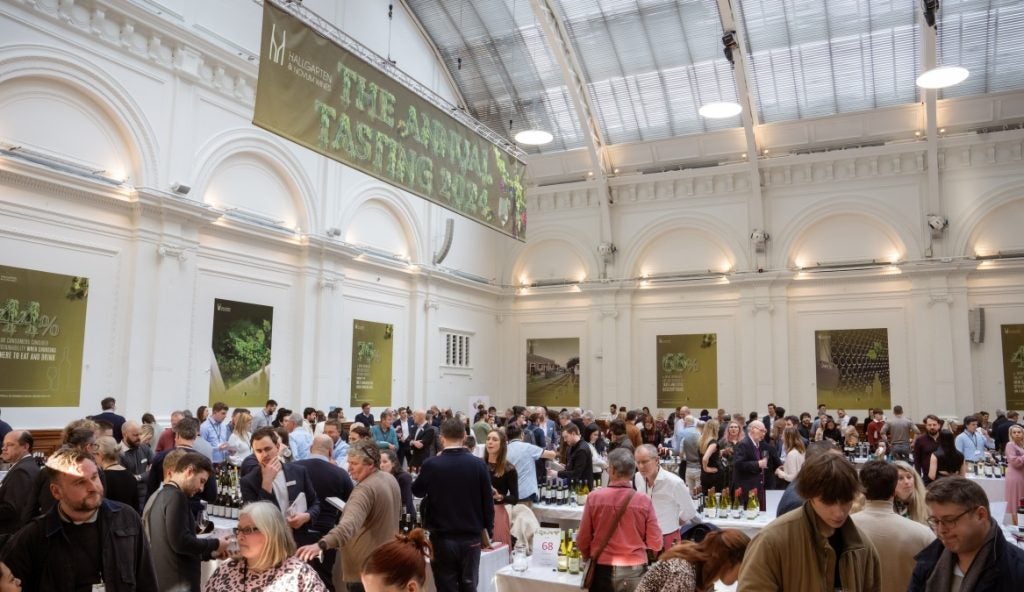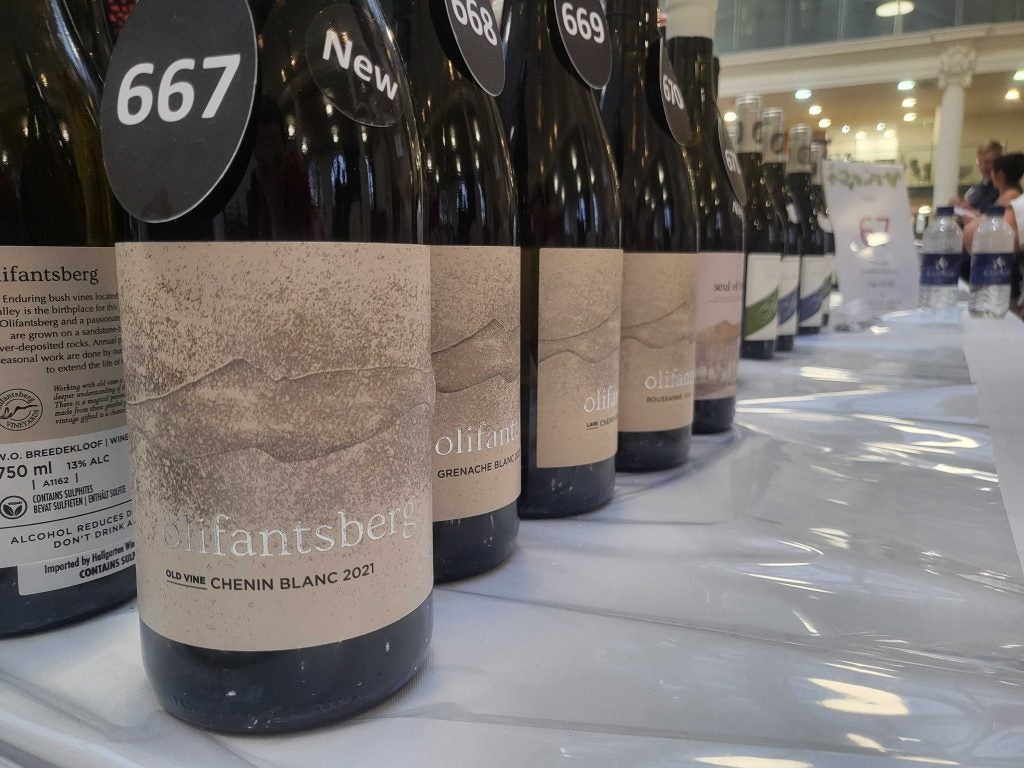
Changes are afoot at UK fine-wine group Coterie Holdings, with a quick succession of appointments, M&A and innovation in recent months.
Coterie, a holding company for bonded storage facility Coterie Vaults, wine lending business Jera, wine merchant Lay and Wheeler and importer-distributor Hallgarten and Novum Wines, appointed industry veteran Michael Saunders CEO in September.
It has since launched Jera, acquired Hallgarten and Novum Wines and appointed UK retailer Marks and Spencer’s head of trading for drinks, Andrew Shaw, as wine director. It is also looking to expand internationally, particularly into Asia, “in the relatively near future”.
Just Drinks caught up with Saunders and Andrew Bewes, managing director of Hallgarten And Novum Wines, at Hallgarten’s annual tasting in London last week.
Just Drinks: Michael, you have hit the ground sprinting at Coterie Holdings. What is your strategy for the business in the next few years?
Coterie Holdings CEO Michael Saunders: Coterie wants to have a very good footprint in the fine-wine business. We have a number of businesses now and there should be some circularity between all the businesses that we operate.
Most people who buy off Lay And Wheeler will want to store it somewhere, so we have got Coterie Vaults. Coterie Vaults has an incredible, brand spanking new 10 million-bottle facility.

US Tariffs are shifting - will you react or anticipate?
Don’t let policy changes catch you off guard. Stay proactive with real-time data and expert analysis.
By GlobalDataWhen customers have stuff in store with us, we do offer some liquidity by offering finance against their portfolio. That’s quite new [Jera], which we’ve found quite a big market for already. Funnily enough, not just with private customers but with hospitality businesses as well, who’ve moved their collections there and then they can borrow money against that.
We’re not trying to be a bank. We’re trying help people with liquidity while they can hold on to their good wine collections. We wanted the hospitality businesses for suppliers because we want great relationships with some of the top producers in the world. Some here, some more will come in over time.
And there is a sort of virtuous circle there. We’re going to start in this country and then over time we will raise our eyes and look elsewhere.
JD: What do you mean by looking elsewhere?
Saunders: Take Coterie Vaults for instance, we’re already looking at opening up ‘vaults’ in other parts of the world because everybody in fine wine knows that the operations and service provision is imperfect elsewhere.
We have the wherewithal and desire to sort that problem out. And then when we open a vault… on the back of that we could start other operations, be they private-client businesses be they hospitality supply business, we’ll see.
I think the values are as important as the strategy – we want to be trusted people, honest people, do what we say, deliver great service, look after our people well, look after our suppliers well, so really quite old-fashioned stuff but stuff that really matters – and works.

JD: Are there any regions in particular you think lack the services Coterie can offer?
Saunders: Asia. We’re looking at Hong Kong, Singapore, Taipei and Tokyo.
We have some advantages there – the family [which owns Coterie] has some offices there already. We’ve got a way to support the businesses locally already. So we should go with that in the relatively near future.
If you look at the Coterie board, you’ll see that I’ve got some colleagues who live in Asia so we will be able to have control locally, i.e. good management oversight.
JD: How are fine-wine logistics different from regular brands or bulk?
Saunders: Temperature control, absolute detail because your case of Lafite at £20,000 ($25,370) or £30,000, you want it to be dealt with immaculately, so it’s as simple as that. It’s metaphorical Crown Jewels.
There are horror stories in Asia of wine containers being left on the side [in hot temperatures]. So we’re going to solve that problem. Or not solve it – other people do it – but we’re going to be trusted and we’re going to be known for doing it.
It’s not going to be just for our private customers. We’re going to set up services for other fine-wine businesses and they are all telling us: ‘Yes, please do it.’
Hallgarten & Novum Wines MD Andrew Bewes: We had a delivery from Lay And Wheeler last week with a nice envelope with a card sticking out saying handpicked by Dwayne or whoever it was. It is a lovely touch, completely impossible to do that for a restaurant but actually that level of service is what’s required when you’re dealing with fine wine.
JD: Are you facing supply-chain issues from the Red Sea crisis?
Bewes: Yes. For us, it’s affecting Australia, New Zealand South Africa. The Red Sea is a big problem.
JD: Is that also pushing up prices?
Bewes: Prices have only really just come back down from the Covid era of a lot of containers sitting outside in the China Sea, waiting to dock. We haven’t yet seen it translate into prices, just delays. But if it carries on much longer it will.
JD: How many countries do you import from?
Bewes: We ship from 23 countries. We ship from the country where the wine was made, loosely, whereas Lay And Wheeler will ship from where the wine is lying (being stored), which is a slight difference. Of course, many times that is from the country of origin, but it could well be from collectors in other parts of the world.
JD: Andrew, how has the transition been for Hallgarten joining Coterie?
Bewes: It’s an evolving picture. To be completely honest, there’s not been a great deal of time as yet to sit down and really thrash out the strategy.
We’re changing our financial year to fall into line with Coterie so we’re running an extended year. From a Hallgarten perspective, we are planning as usual in terms of budgets for the year and finalising our portfolio, new prices for the year, telling customers about that and rewriting all their wine lists. It’s a phenomenally busy time of the year anyway.
The obvious question is: will there be any group strategy or synergy? And the answer is: “Yes.”
We just hired a group data officer, James Scott. There will be areas where we can pool resources and get the best chance of allowing the sum of the constituent parts to be greater than the individual parts.
That’s loosely where we are. Will we stand still? No. Hallgarten has got a very aggressive plan. We’re in the middle of taking on about 25 people, from a base of 100. So 25% expansion, split between sales and support staff.
JD: Are those roles all to be based in the UK? What is the plan there?
Bewes: Yes, we have a small export side but Hallgerten is a UK-focused business. We’re expanding on the sales side and talking, as ever, to lots of interesting potential customers and trying to keep our current customer base happy and focused.
It’s probably fair to say we have a longer queue of potential suppliers interested in working with us than we’ve ever had.
JD: Is that since joining Coterie?
Bewes: It’s always been that way to an extent. If you look at it from a producer’s point of view, if you’re a big player in any part of the world there’s a limited number of distributors in the UK that can offer nationwide distribution and help with selling into all sectors – and we’re one of those.

For the Coterie element, Lay And Wheeler have a lot of fine wines that traditionally we haven’t stocked. We basically buy wines which are ready to drink and a fair proportion of what Lay And Wheeler have on their books is ready to drink, so we can now offer a fuller service into restaurants and retailers who are looking for a simple solution to fine wine.
JD: How will it all work in terms of sharing those services? Do you have a shared portfolio behind the scenes?
Bewes: No, Coterie has taken on Andrew Shaw (hired this month as group wine director), who is currently head of (UK retailer) Marks and Spencer’s wine, and we will look to a group strategy, a group overview of our portfolio.
But we’re so different – the needs of restaurants and retailers through Hallgarten is so different to the needs of the individual consumers who are buying from Lay And Wheeler.
There is crossover of course – for example we’ve just taken Vietti on, from Barolo, they already sell to Lay And Wheeler, who have been buying their wines for some time.
But it won’t be ‘synergy’ in the way that it would if we brought together two wholesalers because Lay And Wheeler is so different to Hallgarten.
Our logistics are completely set up for next-day service to restaurants and retailers, whereas Lay And Wheeler’s warehousing is set up for a much more cosseted process.
They’ve got 5,000 or 6,000 SKUs; we’ve got 1,500. Ours are high volume; theirs are low volume.
We hopefully will have something in place by the beginning of March. We’re not going to hang around but it needs to work.
JD: Do you share other services, like HR?
Bewes: Not yet, it’s very early days. There are some areas where it makes sense to have a group-wide set of standards so HR would certainly be one of those.
But if you looked at something like customer services, the needs of a restaurant or trade business are very different to the individual consumers.
Whether that’s detailed knowledge of fine wine, which Lay And Wheeler may well have to have at the point of contact with the customer, or whereas actually our customers are probably much more concerned about delivery – they assume they’re going to get the right wines, etc, but they need it by 10 o’clock for example. It’s a very different need, so we would never see that happening.
Credit control is very personal in our business, they have relationships with all of their customers. In retail, loosely, everything’s paid for by credit card or upfront. So there’s no need for credit control. But it might make sense to have management accountants who can crunch the numbers for all the companies.
At the moment, we’re not rushing into anything. It’s very much business as usual.
When we were announcing the sale, I did a presentation into the company. There was a slide for before and after and the only difference was two names on our board changed to three names on the second slide.
Nothing else changed, everyone’s jobs are the same. So that was vastly reassuring internally to our staff. I think customers didn’t really notice [either] – and that’s absolutely right and proper.
JD: You mentioned pricing discussions with customers. Will you put up prices this year?
Bewes: Having gone through certainly the worst year I’ve ever experienced in terms of price rises – a double whammy of cost of living price rises from around the world, plus stupid duty rises – it’s been a tough year.
I’m pleased to say that this year we’ve held a vast number of wines. Our pricing is very stable. The average is about 3% on the wines where we’ve had to move, so well below inflation and actually a great relief.

Saunders: Sadly, we’ve got to focus in on the countdowns to changing duty next year, which we’re still fighting like hell. It’s complete madness but I don’t think people have really taken on board what’s going to happen next year.
One of the UK’s biggest retailers thinks it’s unworkable for them. They’re in a spin, saying ‘how do we manage to stick to the law?’ And that’s when legislation is bonkers, when one of the big five can’t figure out how to do it.
JD: What are you calling on politicians to do?
Saunders: It’s just asking for common sense. I’ve obviously been underlining Miles’s [Beale, CEO of the Wine and Spirit Trade Association] position because I have long advocated that the industry speaks with one voice.
We’ve got to gather around the WSTA’s campaign. I’ve been lobbying my MP furiously because I think it’s such nonsense, what’s been planned, but let’s see what gets announced in two weeks. I hope there’s some sanity.
Bewes: We can’t escape the fact we’re a soft target because we’re still seen as a luxury, non-essential part of the grocery basket and the hope is that a) they will see sense, [and] b) a change in government might see more sense.
We’re a soft target because we’re still seen as a luxury, non-essential part of the grocery basket
Hallgarten & Novum Wines MD Andrew Bewes
They will lose more money by imposing yet another punitive rise and actually more than just a punitive rise – it is a change in the system that will really make it very difficult.
We change our vintage wines every year. So for 1,500 wines that’s 30 a week. Technically, you could have a half-degree difference in Chablis between vintages, so that means a change in price.
Does that mean we’re reprinting wine lists across the board, only to have to do it again next week when Rioja changes from 2019 to 2020? It is very difficult to work out.
Saunders: Don’t forget, this is all done on the basis of “simplifying”.
Bewes: In a way, it’s easier for a retailer to be more agile. Just because of the nature of their business.
Saunders: I just did three weeks in Argentina before Christmas and, because of inflation, every menu has QR codes. They don’t have any printed menus anywhere, because they have to change their prices so often. So maybe we’ll get to that [in the UK]!



